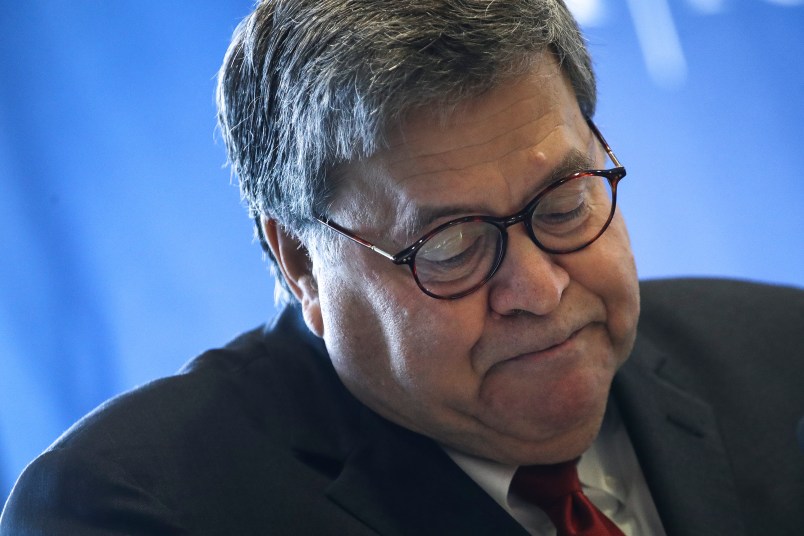A federal judge said Thursday that Attorney General Bill Barr’s “lack of candor” about special counsel Robert Mueller’s findings — in representations of Mueller’s report that “distorted” its conclusions — had prompted the judge to decide to review an unredacted version of the report behind closed doors.
The decision by U.S. District Judge Reggie B. Walton came in a Freedom of Information Act lawsuit brought by a Buzzfeed reporter and the Electronic Privacy Information Center, a civil liberties group. They’re seeking an unredacted version of Mueller’s report, and have pointed to Barr’s misleading statements about the report before it was released to raised doubts about what the Department had decided to redact.
Judge Walton said on Thursday that he agreed with the challengers’ assessment that the Department “dubious[ly] handl[ed] … the public release of the Mueller Report” and the judge said he had “grave concerns about the objectivity” of that process.
He raised specifically how Barr — in a letter nearly a month before the report was released as well as in a press conference the morning it was unveiled — described Mueller’s findings on whether the Trump campaign colluded with or coordinated with Russians in 2016. He also took issue with how Barr characterized the way Mueller went about the obstruction of justice aspect of his investigation.
“The inconsistencies between Attorney General Barr’s statements, made at a time when the public did not have access to the redacted version of the Mueller Report to assess the veracity of his statements, and portions of the redacted version of the Mueller Report that conflict with those statements cause the Court to seriously question whether Attorney General Barr made a calculated attempt to influence public discourse about the Mueller Report in favor of President Trump despite certain findings in the redacted version of the Mueller Report to the contrary,” the judge said.
He also focused on Barr’s decision to issue the March 2019 summary letter weeks before the report itself was to be put out.
“The speed by which Attorney General Barr released to the public the summary of Special Counsel Mueller’s principal conclusions, coupled with the fact that Attorney General Barr failed to provide a thorough representation of the findings set forth in the Mueller Report, causes the Court to question whether Attorney General Barr’s intent was to create a one-sided narrative about the Mueller Report — a narrative that is clearly in some respects substantively at odds with the redacted version of the Mueller Report,” he said.
The judge has ordered the Department to produce for him an unredacted version of the report en camera, meaning not publicly, for him to review behind the closed doors of his chambers.
The court will conduct this “independent review” so it can “determine whether it concurs with the Department’s determination that the redactions of the Mueller Report are authorized by the FOIA exemptions upon which the Department relies,” the judge said.
If the judge determines that all the redacted information “has been appropriately withheld under the claimed FOIA exemptions,” he will issue a decision resolving the FOIA lawsuit in the Justice Department’s favor, the order said.
“Here, although it is with great consternation, true to the oath that the undersigned took upon becoming a federal judge, and the need for the American public to have faith in the judicial process, considering the record in this case, the Court must conclude that the actions of Attorney General Barr and his representations about the Mueller Report preclude the Court’s acceptance of the validity of the Department’s redactions without its independent verification,” the judge said.
Read the opinion below:







Donnie is having a bigly bad week.
Priceless…
Barr is like rust, apparently. Never sleeps and always up to something nefarious. My apologies to rust in advance.
It remains extraordinary that a full copy of the Mueller report, which touches on the gravest matters of national security, has not been made available even to the judiciary until now–pending appeals.
Karma is Coming
First installment
“Wattle” Barr do now?